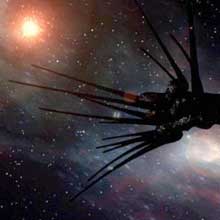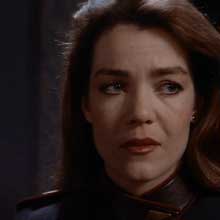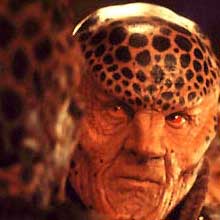By and large, Babylon 5, the SF show created by J. Michael Straczynski during the late ’90s, is almost indefensibly poor. I say this as a fan; of the main series, at least a third of it is borderline unwatchable. Of the spin-offs and made-for-TV films, I have nothing good to say.
 When Babylon 5 is bad, it’s very bad. The first season is difficult to watch, with a leaden turn from Michael O’Hare as the station commander that sets the standard for almost all of the performances, save for a couple of key players. There are only a couple of memorable episodes and the whole thing appears to be a low-rent competitor for Star Trek’s Deep Space Nine. It should be more interesting: a space station five miles long and any number of races, each riven with their own factions and cultures, yet it feels cheap and dull.
When Babylon 5 is bad, it’s very bad. The first season is difficult to watch, with a leaden turn from Michael O’Hare as the station commander that sets the standard for almost all of the performances, save for a couple of key players. There are only a couple of memorable episodes and the whole thing appears to be a low-rent competitor for Star Trek’s Deep Space Nine. It should be more interesting: a space station five miles long and any number of races, each riven with their own factions and cultures, yet it feels cheap and dull.
Matters improve in the second season when O’Hare is moved aside for Bruce Boxleitner, whose particular brand of cheesy determinism as Captain Sheridan makes him a far more believable and likeable leader. It’s also in the second season that the main story arc starts kicking in.
 While Babylon 5 didn’t invent the notion of the series arc, it certainly made an impressive use of it. Star Trek before it followed an episodic model where events in one episode rarely had any bearing on another — this made the show easy to syndicate as episodes could be stuck in any available time slot and didn’t require the viewer to commit, but also meant that character and world development were minimal. Babylon 5 demanded more or less constant attention even during the weaker episodes as they often turned out to have key plot points hidden within. At the time, this was a factor in making the show such a hard sell to people who tuned in once and were turned off by the naff sets, dodgy acting and weird alien hairstyles.
While Babylon 5 didn’t invent the notion of the series arc, it certainly made an impressive use of it. Star Trek before it followed an episodic model where events in one episode rarely had any bearing on another — this made the show easy to syndicate as episodes could be stuck in any available time slot and didn’t require the viewer to commit, but also meant that character and world development were minimal. Babylon 5 demanded more or less constant attention even during the weaker episodes as they often turned out to have key plot points hidden within. At the time, this was a factor in making the show such a hard sell to people who tuned in once and were turned off by the naff sets, dodgy acting and weird alien hairstyles.
You can argue that Babylon 5‘s successful use of the story arc was influential: three seasons into Deep Space Nine, that show also moved to favour arc storylines over episodic, and by the end was almost purely arc-driven to great effect.
The Shadow War
 This main story arc, The Shadow War, is the story of the return of an all-powerful enemy force that threatens the entire galaxy, and is Babylon 5‘s main strength. It doesn’t sound like much when I write it in one sentence, but this arc — which is full-on for roughly two seasons and a bit but is a presence in most episodes — manages to bring us some great SF ideas, a solid script and some performances that I’ve not seen bettered elsewhere.
This main story arc, The Shadow War, is the story of the return of an all-powerful enemy force that threatens the entire galaxy, and is Babylon 5‘s main strength. It doesn’t sound like much when I write it in one sentence, but this arc — which is full-on for roughly two seasons and a bit but is a presence in most episodes — manages to bring us some great SF ideas, a solid script and some performances that I’ve not seen bettered elsewhere.
At its peak, Babylon 5 managed to throw out the sort of plot-twists and revelations that other SF shows only manage once a season, and did it without ever compromising established characters, series lore or getting stuck in plot holes. So, you get time-travelling space stations; aliens manipulating human history, genetics and society; the souls of one race reincarnating into another; God-like beings that walk the gaps between galaxies and hide inside planets; dogfights in Jupiter’s atmosphere; living ships and personalities constructed by monks and telepaths.
 I could go on. The show’s universe turns out to have been steeped in political intrigue and conspiracies, prophecies and a very Clarkian take on faith and spiritualism that sees science and magic as more or less the same. When Babylon 5 is good, it isn’t just good, it’s amazing. Even the naff qualities seem to be less naff.
I could go on. The show’s universe turns out to have been steeped in political intrigue and conspiracies, prophecies and a very Clarkian take on faith and spiritualism that sees science and magic as more or less the same. When Babylon 5 is good, it isn’t just good, it’s amazing. Even the naff qualities seem to be less naff.
Unfortunately, once the arc was dealt with, the series suffered. A fifth season tied up a few loose threads and tried to start new ones, but the characters and scripts were never strong enough to carry any of it: a foe that threatens the galaxy is a tough act to follow. You watch the final season because you feel you ought to, not because you’re really enjoying much of it. You watch to see what happens to some of the characters you’ve grown so attached to, and some of it is interesting, but you’ll rarely shake the feeling that you’re watching an appendix rather than a chapter.
Character
Another of Babylon 5‘s strengths was character development. In SF shows — particularly around the time Babylon 5 was airing — character development just wasn’t something that happened much. By and large, the characters at the end of a series run would be more or less the same as they were at the start. Only the waistlines and facial hair would have changed.
 Babylon 5‘s characters, conversely, generally developed in plausible and interesting ways. Again, this never seemed to be hastily stuck on; you could always go back through the episodes and see how subtle changes you’d never noticed before were there all along, leading up to more notable shifts. Character development remained consistent with the character. Notable examples include Doctor Franklin’s involvement in an underground railroad and his descent into drug addiction, and Ivanova’s relationship with a female telepath.
Babylon 5‘s characters, conversely, generally developed in plausible and interesting ways. Again, this never seemed to be hastily stuck on; you could always go back through the episodes and see how subtle changes you’d never noticed before were there all along, leading up to more notable shifts. Character development remained consistent with the character. Notable examples include Doctor Franklin’s involvement in an underground railroad and his descent into drug addiction, and Ivanova’s relationship with a female telepath.
On the other hand, the character arc for Delenn turned her from a steely and mysterious alien priest to a drippy, whining ball and chain around Sheridan’s neck, and the character arc for Marcus led him from being an annoying, unfunny Aragorn-wannabe to an annoying, unfunny Aragorn-wannabe clinging to Ivanova’s side so, you know, it wasn’t all tea and dumplings.
 Most importantly, the arcs of G’Kar and Londo Mollari have yet to be bettered in any other genre show, though some of the works of Ronald Moore come close (particularly the development of Battlestar Galactica‘s Gaeta, whose character arc was memorably described by many as “Anakin Skywalker done properly”). G’Kar, introduced as a scheming and mercenary character goes through immense personal loss and suffering, not just for himself but for his entire race, to come out on the other side as a Ghandi-like spiritual leader. At the same time, Mollari, introduced to us as a washed-up, heavy-drinking diplomat stationed at the arse-end of nowhere, makes a Faustian pact that sees him trading his life and the lives of many others for power. The two arcs are heavily intertwined and the actors, Peter Jurasik and the late Andreas Katsulas, bring us not just the best acted-characters in the show, but in pretty much any SF show to date. They define Babylon 5 more than anything.
Most importantly, the arcs of G’Kar and Londo Mollari have yet to be bettered in any other genre show, though some of the works of Ronald Moore come close (particularly the development of Battlestar Galactica‘s Gaeta, whose character arc was memorably described by many as “Anakin Skywalker done properly”). G’Kar, introduced as a scheming and mercenary character goes through immense personal loss and suffering, not just for himself but for his entire race, to come out on the other side as a Ghandi-like spiritual leader. At the same time, Mollari, introduced to us as a washed-up, heavy-drinking diplomat stationed at the arse-end of nowhere, makes a Faustian pact that sees him trading his life and the lives of many others for power. The two arcs are heavily intertwined and the actors, Peter Jurasik and the late Andreas Katsulas, bring us not just the best acted-characters in the show, but in pretty much any SF show to date. They define Babylon 5 more than anything.
httpv://www.youtube.com/watch?v=uQARSzT2lbo
How to watch today
Every episode is available on DVD for rent or purchase and most, if not all, episodes can be bought from iTunes. You can probably not bother with the first season, though the episodes Mind War, Signs and Portents, A Voice in the Wilderness, Babylon Squared and Chrysalis are all referenced later on in the show and are decent episodes in their own right.
The second season is more watchable than the first, and the arc starts making its presence felt more and more so it’s worth watching the whole lot. The entire third season should be watched, as should the first six episodes of season four. After that point, the show’s quality begins to drop, though at this stage it’s still worth watching to see Sheridan turn his attention back to Earth — it’s the ‘Scouring of the Shire’ part of the story. Certainly the final episode of season four, The Deconstruction of Falling Stars, should be watched. This episode tells the future history of humanity right up until our sun goes nova: it’s an Olaf Stapledon novel in 45 minutes, essentially.
Season five could be missed out, but if you’ve enjoyed what you’ve seen by this point you may feel (as I did upon re-watching) that it’s worth a look. Of particular interest is the conclusion of the G’Kar/Mollari arc, foreshadowed since the very first season. Aside from that, there’s not a lot there.
There’s about half a dozen standalone films and a failed spin-off series, Crusade. Only watch these if you’re a big fan, and even then, don’t expect too much.